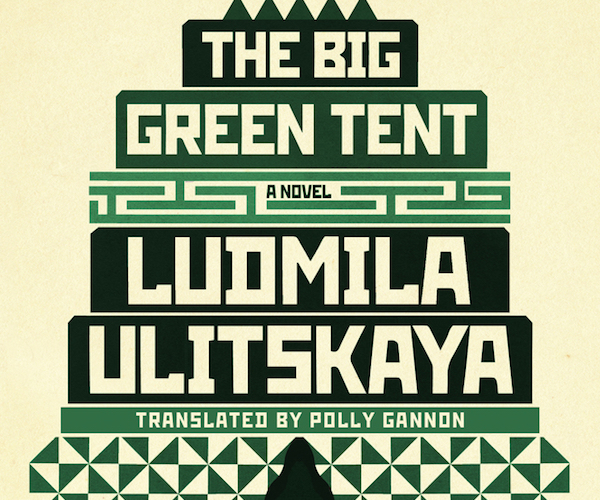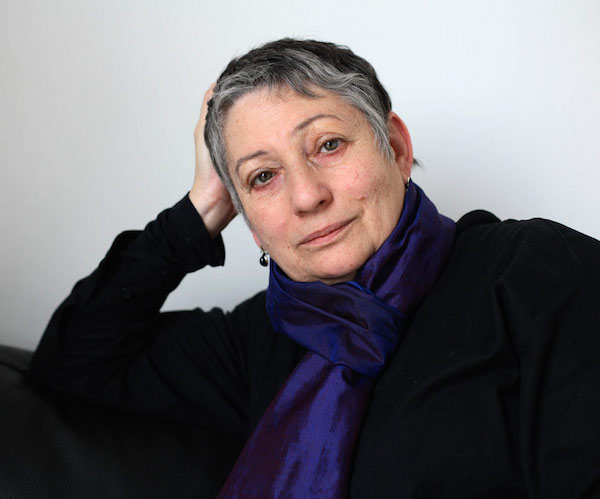Book Review: “The Big Green Tent” — Lives Lived Without Trust, Memorably Conveyed
As we read we find ourselves rooting for all of these ordinary folk who survived — and are still surviving even now — one of the bleakest and saddest periods in Russia’s history.
The Big Green Tent by Ludmila Ulitskaya, Translated by Polly Gannon, Farrar, Straus & Giroux, 579 pages, $35.

By Roberta Silman
I first came across the work of Ludmila Ulitskaya in the spring of 2014 when I read and loved her short story “The Fugitive” in The New Yorker. And then, a few months later, there was a wonderful article about her by Masha Gessen in that same magazine, and I was fascinated by her personal story. Born in 1943 of Jewish intellectuals — a biologist and an engineer — Ulitskaya made her way into writing by a circuitous path that included work as a scientist and a dramaturge for a Yiddish theater company, an early unsuccessful marriage, two sons whom she brought up herself, and, finally, when she was in her 40s, published stories and novels which have made her famous in Russia and Europe but still relatively unknown here, as well as a late, contented marriage. Her wry sense of humor, her refusal to compromise, her emphasis on personal loyalty, her activist principles, and her personal trajectory (marriages, children, bout with breast cancer) reminded me of my teacher and friend, Grace Paley, and I remember thinking as I read that if there is an afterlife, they will surely find each other.
Moreover, I think their talents lie in the same direction. Although The Big Green Tent is being called a sweeping, epic novel similar to War & Peace and Dr. Zhivago, I think it is more a series of intertwined stories — like Turgenev and Babel — that reveal individual struggles in indelible ways. Ulitskaya is not really interested in character development or a strong narrative thread — there are no Yuri and Lara here, no Natasha and Pierre. Instead, Ulitskaya gives us a tableaux of so many different people in Russian society that this novel resembles a Brueghel canvas or a medieval tapestry more than anything else. As we read we find ourselves rooting for all of these ordinary folk who survived — and are still surviving even now — one of the bleakest and saddest periods in Russia’s history.
The book begins with Stalin’s death, and ends in 1996, and by then the main characters — three men who met at school — Ilya, Sanya, and Mikha — are either dead or have emigrated. And there is no chronology really. Stories are told willy-nilly, often overlapping each other, and through this somewhat chaotic method we sense how life is being lived: where nothing seems certain, where everything can turn on a dime. Their complicated lives, their interests, their parents, their wives, their mistresses, their children, their teachers, their friends, even their pets are depicted with piercing clarity, and what the reader takes away is the portrait of a country whose government hounds its people — sometimes to death — and creates an atmosphere so threatening that it is almost impossible to maintain any kind of moral, intellectual or material equanimity. What saves most of them is what has always saved the Russian soul: music and literature and art or the hope of love, or, among the strongest, the ability to fight back.
I am old enough to recall the excitement of the publication of Pasternak’s Doctor Zhivago and the events that followed it in the late 1950s, the appearance of Yevtuskenko (not really a wonderful poet, but we thought so then) on American television, and the enormous influence of samizdat (the clandestine distribution of literature repressed by the government) as the Russian people began to read not only their own forbidden writers, but writers from all over the world. What samizdat, especially Pasternak’s novel, meant to the Russian people is one of the threads that weaves these stories together, and Ulitskaya does that beautifully. In lives as impoverished as those she is describing, books are as important as bread and some of the most charming parts of the novel are the discussions of a group of students who call themselves the LORLS, Lovers of Russian Literature.
Here is their teacher Victor Yuleivich musing on that:
Life outside the bounds of literature was harsh and abusive, but the world of books offered living thought, and feeling, and learning. It was impossible to bridge these two realms, and he retreated farther and farther into literature.
and a little later he tells the LORLS:
“Literature is the only thing that allows us to survive, the only thing that helps us to reconcile ourselves to the time we live in …”
And when one of his students has given him a copy of Zhivago, typed by her grandmother who knew Pasternak:
“I knew you would like it. I was right, wasn’t I? You did like it?”
“More than you can know, Katya. More than you can ever know. A book like that changes one’s life. I will be grateful to you until the day I die.”
“Really?” Her eyelashes opened wide, and her eyes lit up.
My God, it’s Natasha Rostova. Natasha Rostova in the flesh!
It took his breath away.
But Ulitskaya is equally good at giving us the crowded apartments, the search for sexual fulfillment despite the appalling lack of privacy, the dirty March slush on the pot-holed streets of Moscow, the bitter cold, the terror when there is a knock on the door, the ongoing anti-Semitism, and the retreat into dreams and imagination — almost a kind of magical realism — as in the outstanding chapter “The Big Green Tent” in which we get all of Olga’s life with Ilya. And she is unsparing in her portraits of the government officials and those close to them: those too stupid to fight the bureaucracy, to those who are merely “doing their jobs,” to the truly sadistic, evil people who take pride in making others suffer, who conspire with the officials against their relatives and friends and neighbors and whose decisions will haunt them until they die.
How can anyone even try to live a normal life in such a country? This seems to be the underlying question where the history is so tangled, where the lies have become almost identical to the truth, where no one seems to know where to turn. Here is Ilya telling Olga about one Valentin Kulakov:
“Strange as it may seem, we have only one thing in common: Stalin. Though he doesn’t hate him for the blood, for the Terror, but for trampling his own ideals… Stalin betrayed Lenin, but Lenin had already distorted Marx, though Marx had some sort of misunderstanding with Hegel, whom Marx didn’t altogether understand correctly, at least as Kulakov saw it … and for life to unfold and develop as it should, in accordance with the laws of dialectical materialism, everything had to be brought down to a common denominator and adjustments had to be made everywhere, and Stalin had to be exposed as a criminal, an enemy of the idea of socialism. There is a whole group of them who are prepared to walk through fire over some quotation or other from State and Revolution.”
“Oh, you don’t have to explain. It sounds just like my mother.”
“No, not at all! She’s a completely different breed. She’ll believe whatever they order her to believe. But this one uses his own brains, he’s seeking the truth, comparing texts and checking them against one another,” said Ilya…
In the end no one can be trusted, and trust is even more important than bread and books, it is as important as air. And here is a writer, a woman who is not afraid to record what lives without trust mean for so many — for those of us who have observed the Russian dilemma from afar, for those who have lived it and sought escape (as many of those dissidents we all know), and for future generations who will read this book with as much interest as we read Tolstoy and Chekhov and Pasternak.

Author Ludmila Ulitskaya — she gives us a tableaux of so many different people in Russian society that this novel resembles a Brueghel canvas or a medieval tapestry more than anything else. Photo: pen.org
I have only two disappointments. These are complex stories, and as you read, your emotions will veer from anger to hope to fear as you try to negotiate your way through them. To help the reader with that, I wish the publisher had included a list of the main characters and their relationships to each other.
And, although my reading Russian is only good enough to get me through a fairly simple Chekhov story, I must report that I had some discomfort reading the first part of the novel. At times I felt that the prose was leaden but then as I got further into the book, it seemed to improve, and I realized that it might be the translation.
This is tricky terrain, and reams have been written and can be written about translation. There seem to be no rules. I can only confess that when a translation is superb, as it is in two books my readers know I love — The World of Yesterday by Stefan Zweig and translated by Anthea Bell, or my recently reviewed Death by Water by Kenzaburo Oe and translated by Deborah Boliver Boehm — you read along happily and never question what is going on. When the prose is off and you are reading a translation, you simply don’t know if it’s the author or the translator; moreover you will never know. But when I compared the story, “The Fugitive,” translated by Bela Shayevich with the same section in the novel, I realized that I much preferred the one in the magazine; it was sharper, cleaner, more compelling. And when I went back to the earlier portions of the novel, I saw that Polly Gannon sometimes seemed to make things more ponderous than they may be in the original. So my only caveat is that if you are a Russian reader, try to read this novel in Russian.
But read it, even in translation, and put it next to your Russian classics because here is an unflinchingly honest record of a time in history that is filled with such a range of torment that it must be documented to be believed.
Roberta Silman‘s three novels—Boundaries, The Dream Dredger, and Beginning the World Again—have been distributed by Open Road as ebooks, books on demand, and are now on audible.com. She has also written the short story collection, Blood Relations, and a children’s book, Somebody Else’s Child. A recipient of Guggenheim and National Endowment for the Arts Fellowships, she has published reviews in The New York Times and The Boston Globe, and writes regularly for The Arts Fuse. She can be reached at rsilman@verizon.net.
Tagged: FSG, Ludmila Ulitskaya, Polly Gannon, Russian fiction, Russian history, The Big Green Tent
